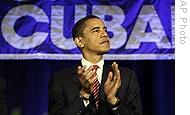voa标准英语2008-Miami Cuban-Americans Shifting Opinion on Cuba E
搜索关注在线英语听力室公众号:tingroom,领取免费英语资料大礼包。
(单词翻译)
A new U.S. public opinion poll shows long-time support for the U.S. embargo1 against Cuba is falling among the Cuban-American community in Miami. VOA's Brian Wagner reports from southern Florida the poll reflects a shift of opinion away from harsh policies toward Cuba. The question has been a staple2 in the yearly poll conducted by Florida International University since 1991. Cuban-Americans in the Miami area are asked whether they favor or oppose continuing the U.S. embargo of Cuba.
The question has been a staple2 in the yearly poll conducted by Florida International University since 1991. Cuban-Americans in the Miami area are asked whether they favor or oppose continuing the U.S. embargo of Cuba.For years, the majority of Cuban exiles supported the trade restrictions3 even while recognizing the embargo had little impact on the Communist government in Havana. But the latest poll shows the tide is shifting, and now 55 percent of people said they oppose continuing the embargo.
Hugh Gladwin is director of the university's Institute for Public Opinion Research, which conducts the poll.
"The biggest factor in the changing position on the embargo is the number of younger people who arrived more recently from Cuba has been increasing. And the number of people who arrived in the 1960s has been decreasing," he said.
 |
| Fidel Castro (file photo) |
Recent arrivals tend to favor closer ties with Cuba, partly because they still have family and friends on the island, while those who fled Cuba decades ago have powerful feelings about the rise of former President Fidel Castro and his Communist government.
Elsewhere in the United States, the embargo and U.S. policy toward Cuba receives little attention. Most Americans do not support the trade and economic restrictions, which were first imposed in 1962 and expanded in 1996.
Another key question the poll asked was what should happen now, and what president-elect Barack Obama should do when he takes office next month. Gladwin said researchers are still studying the responses, which included people saying they expected Mr. Obama to make no real changes.
"But I would say much more frequently were responses like 'maybe now things will change.' The thing I noticed a lot is that people are just fed up with the situation," said Gladwin.
 |
| Obama at an Independence Day Celebration at the Cuban American National Foundation, Miami, 23 May 2008 |
During the campaign, president-elect Barack Obama tried to tap into frustrations4 about how U.S. policy has failed to weaken the Communist government in Havana. He did not promise to end the embargo, but the incoming president said he will review other U.S. restrictions and would be open to meeting Cuban leaders.
The big question is whether Cuba policy and possible reforms will be high on the political agenda, once Mr. Obama takes office.
 收听单词发音
收听单词发音 




